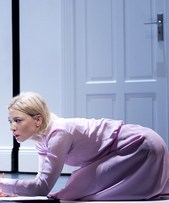SITE GUIDE
SEARCH
REVIEWS
REVIEW ARCHIVES
ADVERTISING AT CURTAINUP
FEATURES
NEWS
Etcetera and
Short Term Listings
LISTINGS
Broadway
Off-Broadway
NYC Restaurants
BOOKS and CDs
OTHER PLACES
Berkshires
London
California
New Jersey
DC
Connecticut
Philadelphia
Elsewhere
QUOTES
TKTS
PLAYWRIGHTS' ALBUMS
LETTERS TO EDITOR
FILM
LINKS
MISCELLANEOUS
Free Updates
Masthead
Writing for Us
A CurtainUp  London Review
London Review
 London Review
London ReviewGross und Klein
|
This is the kind of mindless violence that festers under urban malaise.
— Man
|

|
There are moments of pure absurdity; for instance, in the block of flats where Lotte meets someone concealed inside a green tent, who never comes out when anyone else is around but moves the tent across the room reminding me of my daughter’s sleepover parties when, with their legs inside their sleeping bags, the little girls shuffled around the room on their knees like oversized caterpillars. The absurdist humour will tickle some of the audience but not all. There are also quite sexually explicit moments, of genital rubbing or the wafting of deodorant around Lotte’s crotch which I wasn’t totally comnfortable with, but which engendered hearty laughter. Other moments are like a revue sketch, as when Lotte rings different bells on the apartment intercom looking for the one person she thinks lives there.
Some images are very powerful and stay with you. When Lotte meets her husband’s new mistress, the status of this woman is exposed when she unzips her dress to reveal a T shirt emblazoned with the face of Lotte’s husband. In one image, more has been said about the shifting relationship than in dozens of conversations. In another scene, the tall, thin piece of a corner set pushes forward with Lotte trapped inside it, in a brilliant depiction of the claustrophobia of mental walls closing in on you. We could feel how oppressive the walls were becoming. Much of the dialogue falls on Cate Blanchett as Lotte and several scenes call for her spoken reflections and observation. She is an amazing actress but this play is hard work for one person because Lotte is the only character we care about.
The opening scene sees Lotte on holiday in Agadir, Morocco commenting on her fellow travellers except that it isn’t possible to imagine Lotte would not be hit upon by the many Moroccan men offering extra services to tourists. The second scene has her looking into the flat of an arguing couple where the woman has a large fashion wardrobewhich she invites Lotte to comment on. The second act opens with a scene in a glass fronted telephone box, Lotte’s hands on the glass showing the confined nature of her distress. The family scenes has her brother’s children, two enfants terrible, Albert and Josfina recommending that people should not procreate. Albert obsesses with sex and masturbates and Josefina is a teenager with a drink problem. In a beautifully set up stylised office, Lotte tries to hold down an office job but stress takes its toll on her sanity.
I suspect this play might need to be seen on several occasions before you would start to understand the many complex threads but you might need a degree of obsession to undertake this or at least a relationship with the production.
|
Subscribe to our FREE email updates with a note from editor Elyse Sommer about additions to the website -- with main page hot links to the latest features posted at our numerous locations. To subscribe,
E-mail: esommer@curtainup.comesommer@curtainup.com
put SUBSCRIBE CURTAINUP EMAIL UPDATE in the subject line and your full name and email address in the body of the message -- if you can spare a minute, tell us how you came to CurtainUp and from what part of the country. |
| Gross und Klein
Written by Botho Strauss English text by Martin Crimp Directed by Benedict Andrews Starring: Cate Blanchett With: Lynette, Curran, Anita Hegh, Belinda McClory, Josh McConville, Robert Menzies, Katrina Milosevic, Yalin Ozucelik, Richard Piper, Rochard Pyros, Sophie Ross, Chris Ryan, Christopher Stollery, Martin Vaughan Set Designed by Johannes Schütz Lighting: Nick Schlleper Composer and Sound Design: Max Lyandvert Costume Design: Alice Babidge Running time: Two hours 45 minutes with one interval Box Office: 020 7638 8891 Booking to 29th April 2012 Reviewed by Lizzie Loveridge based on 14th April 2012 performance at the Barbican Theatre, Silk Street, London EC2Y 8DS (Tube: Barbican or Moorgate) |
|
REVIEW FEEDBACK Highlight one of the responses below and click "copy" or"CTRL+C"
Paste the highlighted text into the subject line (CTRL+ V): Feel free to add detailed comments in the body of the email . . . also the names and emails of any friends to whom you'd like us to forward a copy of this review. |




